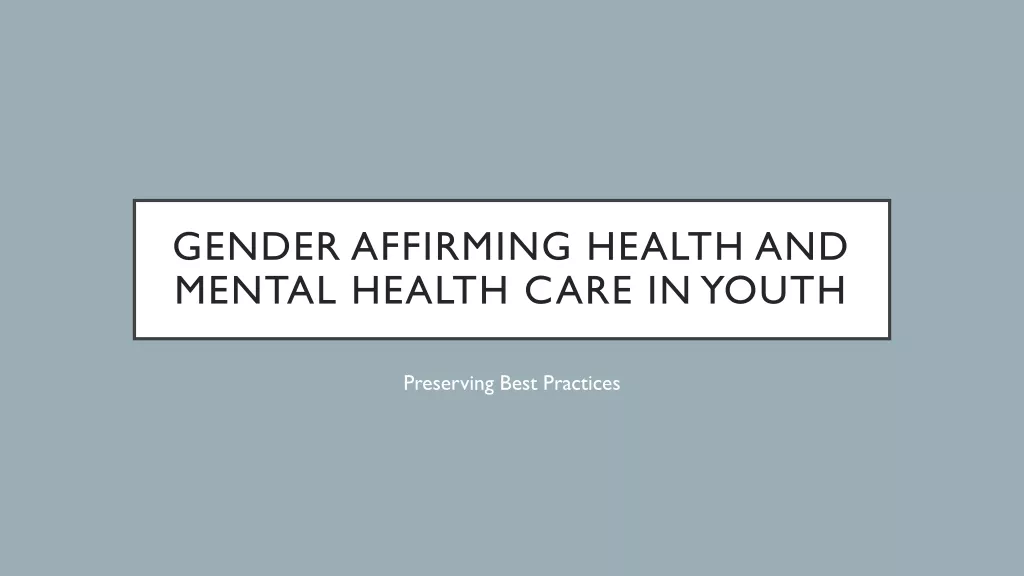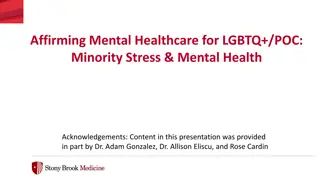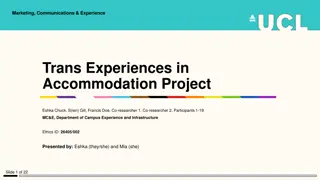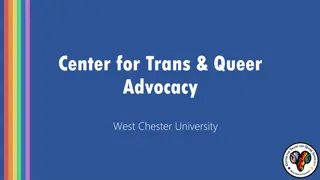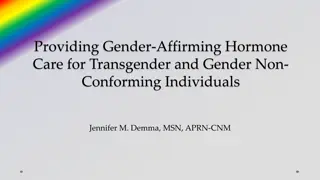Comparative Views on Gender Affirming Care for Trans Youth
Explore the controversies surrounding gender affirming care for trans youth, comparing the Dutch Protocol with US legislative failures and backlash from various countries. Learn about the challenges faced by trans children in accessing appropriate healthcare services and the differing perspectives on gender identity services. Delve into the psychological distress of gender dysphoria and the criteria for treatment, while examining the support and opposition to gender affirming care across nations.
Download Presentation

Please find below an Image/Link to download the presentation.
The content on the website is provided AS IS for your information and personal use only. It may not be sold, licensed, or shared on other websites without obtaining consent from the author. Download presentation by click this link. If you encounter any issues during the download, it is possible that the publisher has removed the file from their server.
E N D
Presentation Transcript
Medical Revolt and the Abandonment of the Dutch Protocol: Comparative Views on the Provision of Gender Affirming Care to Children By Eliot T. Tracz
Roadmap Trans youth, and how the United States has failed them Gender Dysphoria and the Dutch Protocol Backlash: European and United States Perspectives Is it science or prejudice? August 13, 2024 2
Trans Youth in the United States According to the Williams Institute, there are roughly 1.6 million transgender people age 13 and up in the United States About 300,000 are ages 13-17 About 1.4% of minors identify as Transgender Exact numbers are impossible to obtain August 13, 2024 3
U.S. Legislative Failures Towards Trans Children Americans with Disabilities Act State level exclusions Bathrooms Sports Clothing Health Care August 13, 2024 4
The Dutch Protocol Gender Dysphoria: psychological distress that results from an incongruence between one s sex assigned at birth and one s gender identity. Criteria for determining the appropriateness of puberty blockers: (i) a presence of gender dysphoria from early childhood; (ii) an increase of the gender dysphoria after the first pubertal changes; (iii) an absence of psychiatric comorbidity that interferes with the diagnostic work-up or treatment; (iv) adequate psychological and social support during treatment; and (v) a demonstration of knowledge and understanding of the effects of puberty blockers, feminizing/masculinizing hormones, surgery, and the social consequences of sex reassignment. Treatment may include counseling and puberty blockers. Surgery not an option before age 18. August 13, 2024 5
Backlash Europe United States Finland Sweden Norway France United Kingdom States protecting Gender Affirming Care States opposing Gender Affirming Care August 13, 2024 6
Comparative Views United Kingdom Florida Independent Review of Gender Identity Services for Children and Young People (Cass Review) Administrative Rules of Florida Board of Medicine Legislative Steps August 13, 2024 7
Is it Science, or is it Politics? Not just a partisan conservative issue? Is there a legitimate basis for medical concern? How should it be addressed? Politicizing gender-affirming care only hurts the very people that legislation allegedly protects. August 13, 2024 8
Thank you! August 13, 2024 9





